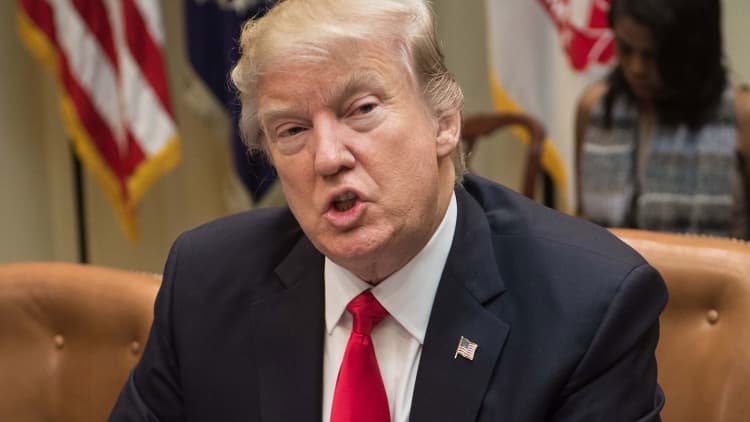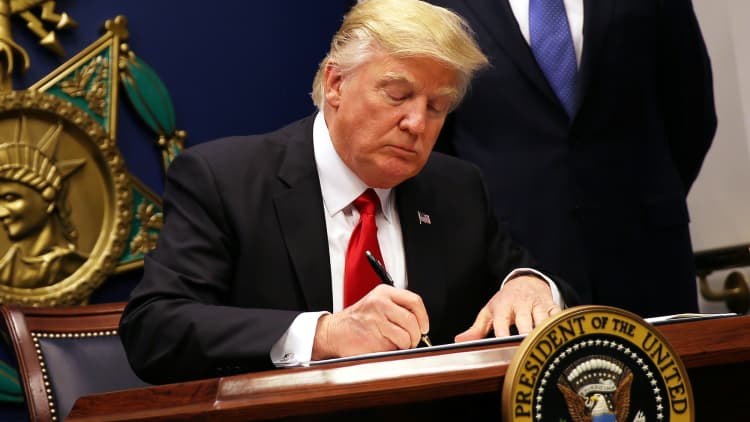
What happened? No single thing prompted today's little market air pocket. The backdrop into and over the weekend featured plenty of preconditions for a "Why not sell a little?" impulse:
- We'd gone months without any noteworthy pullback—a gentle grind with an upward tilt that compressed the VIX down to below 11. While itself no guarantee of a downside dive, long periods of calm give way to storms—which tend to feel worse than they are for being unfamiliar.
- Barron's runs "Dow 30K" on the cover (even if couched as a long-term call), and many remarked on a major bulge in insider selling last week.
- February has a well-earned reputation for market shakeouts (though not major trend changes) so that's no doubt in traders' minds.
- We tagged 20k and 2300 on the S&P 500, lending a feeling of "culmination" rather than "a new beginning."
Here's what else I'm watching heading into the closing bell:
Trump not totally to blame
-The Trump/policy controversies can't be denied as an overlay on the action. But I'll stick by what I wrote on Thursday: "When we do get a downside gut check in stocks, you can bet there will have been some alarming/destabilizing/provocative word or action from the president in the vicinity to act as a convenient after-the-fact excuse for the drop. And when/if this happens, Trump might get an outsized measure of the blame for a pullback, just as he's been given probably too much credit for the rally to this point. The truth, almost always, lies in between."
Keep today in perspective
-Is the market expressing some impatience and frustration with the administrations apparent priorities and tactics? It's plausible. Does it seem increasingly as if Trump is fixated on campaign crowd-pleasers on immigration, walls and tariffs rather than a deeply held faith in the necessity of tax cuts and deregulation? Sure, maybe. Is there a chance policy starts to look like a burden on business (immigrant tech employees, homebuilders worried of labor shortages, possible "tweet-shaming" of CEOs by name) rather than a help? I guess so. But I don't know that we need to lean too heavily on these factors to explain a 1 percent drop from a near-all-time high after a 10 percent 12-week rally and a 25 percent 12-month surge.
Trump trade unwind
-If there were to be some unwinding of the hackneyed "Trump trade," it would look a lot like today's action. Cyclicals, transports, financials, energy all lead the market lower, while defensive stocks outperform and bond yields stagnate. Underperformance of Big Tech companies whose CEOs have voiced opposition to the travel restrictions shows some wariness about retaliation or general lack of sway with the administration (Google, Netflix). Of course, the Nasdaq 100 has also been an outperformer, so there are some gains ready to be taken out of that group.
Uptrend not busted
-Today's action doesn't tell us much at all about whether this is the start of a more severe pullback, or worse. The uptrend hasn't been busted, the pop in the VIX is right around the magnitude you'd expect, etc. I've referred to August/September, when one of these long, tight ranges eventually led to a 3-4 percent stumble. Something like that might be underway—who knows? The key will be to watch sentiment indicators if this dip deepens. Bulls would want to see a quick uptick in fear, not a cool-and-collected attitude in the face of weakness. With no knowledge of what lurks in the minds of the trading algorithms, the market trades as if there was a ready bid at the minus 1 percent level (provided certain other conditions were met). Credit markets are fairly tame, if a touch softer—perhaps as funds make room for Microsoft's monster $17 billion debt sale.
Fed statement Wednesday
-Personal income/spending shows the broadly favorable consumer backdrop is intact. The year-over-year gain in real personal spending was 2.7 percent for all of 2016, hardly a household economy in crisis. Nothing that would preclude the economy encountering another first-quarter soft patch, but not much aside from precedent and (maybe) the still-muted Treasury-yield levels suggest it's in the offing. I suppose there's a small measure of suspense about how all this might color the Fed's statement this week. At the margin, down-scaled expectations on tax/regulatory reform would make investors a bit less tolerant of perceived hawkishness by Yellen, even as the inflation-revival story gets a bit louder globally.



